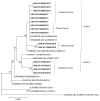Human Adenovirus 7d Strains Associated with Influenza-Like Illness, New York, USA, 2017-2019
- PMID: 32310076
- PMCID: PMC7181932
- DOI: 10.3201/eid2605.200116
Human Adenovirus 7d Strains Associated with Influenza-Like Illness, New York, USA, 2017-2019
Abstract
Human adenovirus 7d is a respiratory pathogen capable of causing acute respiratory disease of variable severity. Phylogenetic analysis of whole-genome sequences of 15 strains isolated from cases of influenza-like-illness during 2017-2019 demonstrated the circulation of 2 distinct clades of genomic variant 7d in colleges in New York, USA.
Keywords: Human adenovirus 7; New York; United States; colleges; genetic diversity; influenza-like illness; phylogenetic analysis; viruses; whole-genome sequence.
Figures

References
Publication types
MeSH terms
Grants and funding
LinkOut - more resources
Full Text Sources
Medical

